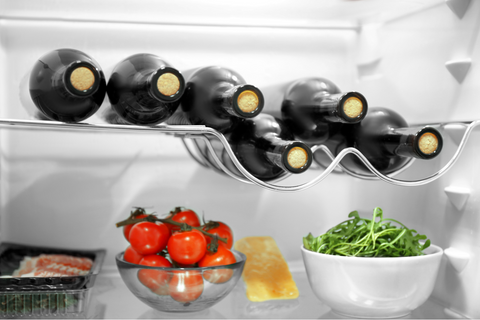Wine, with its myriad of flavors and aromas, is a delicate dance of chemistry and craftsmanship. How we store it plays a crucial role in preserving its character. In this article, we embark on a journey to answer some of the most pressing questions about wine storage. Does wine go bad if not refrigerated? Is it okay to store wine at room temperature? Does red wine need to be refrigerated? And where exactly should you store that bottle of unopened wine? Join us as we uncork the secrets of proper wine storage.
Does Wine Go Bad if Not Refrigerated? Debunking the Myth

Ah, the age-old concern that has swirled around wine enthusiasts for generations - does wine sour into an unpalatable concoction if it's not nestled in the chilly embrace of a refrigerator? The answer, much like the wines themselves, is a nuanced one, intricately woven with the type of wine you're dealing with.
The Tale of Two Wines: Everyday vs. Fine Wines
Let's dissect this myth by categorizing wines into two distinct personas. On one hand, we have your everyday, easy-drinking wines – think Sauvignon Blancs, Pinot Noirs, and their amiable ilk. These wines are akin to your low-maintenance friends, content to laze about in your wine rack or pantry. They're perfectly happy as long as they're away from glaring sunlight and extreme temperatures. Storing them in a cool, dark place is akin to offering them a hammock in the shade - they'll rest easy.
On the other hand, we have the more delicate, nuanced beings - the fine Chardonnays, the venerable Bordeaux, and their esteemed companions. These wines, akin to the connoisseurs of the wine world, deserve the royal treatment. They thrive in a controlled environment, much like an artist in their studio, where temperature and humidity are meticulously regulated. A wine fridge or cellar is their sanctuary, allowing them to age with grace and complexity.
The Dance of Temperature and Time
Now, let's address the vital players in this delicate dance: temperature and time. Picture them as the conductors orchestrating the symphony of flavors within a bottle of wine. For the everyday wines, room temperature, typically hovering around 55-65°F (13-18°C), is their sweet spot. It allows them to evolve at a leisurely pace, revealing layers of taste and aroma with every passing year.
However, extremes are never a wine's best friend. Too hot, and it's like sending them to a never-ending summer camp - they age too quickly, and the results are often disappointing. Too cold, and they decide it's time for a hibernation of sorts, their flavors becoming dormant.
Is it Okay to Store Wine at Room Temperature? The Goldilocks Dilemma
So, what's the deal with room temperature? Is it a friend or foe to your prized bottles? Well, it's a bit of a Goldilocks situation, my friend.
Room temperature, that elusive term, varies from place to place. In a cozy British cottage, it's quite different from a sunny Californian bungalow. Generally, though, it's considered around 55-65°F (13-18°C). For most wines, this is just right. It allows them to age gracefully, letting the flavors mingle and mature. But remember, extremes are never a wine's best friend – too hot, and it ages too fast, too cold, and it takes a nap.
Does Red Wine Need to Be Refrigerated? Navigating the Red Sea

Red wine, that bold and charismatic character in the wine world, marches to the beat of its own drum when it comes to storage.
Here's the scoop: red wines are like the hearty oaks of the forest. They're more robust and can withstand a wider range of temperatures compared to their white counterparts. Room temperature is generally fine for reds. But, if you're planning on keeping that bottle of Cabernet for a few years, a cool, dark cellar or a wine fridge is your best bet. It slows down the aging process, letting the wine evolve in its own time.
Where Do You Store Unopened Wine? The Waiting Game

You've just acquired a bottle of wine that promises to be the star of your next celebration, but the curtain hasn't risen yet. It's the waiting game, a period of anticipation where your bottle's potential is locked away, waiting for the right moment to shine.
1. Dark and Stable: The Ideal Quarters
Picture this: your bottle of wine is like a recluse who prefers solitude. It yearns for a dark and stable environment, away from the prying eyes of sunlight and the erratic whims of temperature. Sunlight, with its UV rays, can wreak havoc on your wine, causing premature aging and undesirable flavors. So, it's essential to find a spot that's consistently cool and devoid of direct sunlight.
2. Wine Rack: A Stylish Abode
A wine rack can be a charming and practical choice. These racks often come in various styles and sizes, making them suitable for any space. Just ensure that the wine rack's location aligns with the principles of wine storage – a cool, dimly lit corner of your home. This setup allows your unopened wine bottles to rest peacefully until their grand debut.
3. Cool Closet: Hidden Gem
If you're short on space or don't want to invest in a dedicated wine rack, a cool, dark closet can be your wine's sanctuary. Closets, typically located in the interior of your home, maintain a relatively stable temperature. Just be cautious not to overcrowd the space, as proper air circulation is vital for long-term wine storage.
4. Wine Fridge: The Connoisseur's Choice
For those who are serious about wine preservation, a wine fridge is a worthwhile investment. These specialized appliances offer precise temperature control, ensuring your wines age gracefully. They're available in various sizes and configurations, catering to both small collections and extensive cellars. A wine fridge provides an optimal environment for your unopened bottles, allowing you to customize the conditions to suit each wine's needs.
5. Wine Cellar or Storage Facility: The Epic Journey
If you're a collector with a passion for aging wines over several years, a dedicated wine cellar or storage facility may be in your future. These locations are the equivalent of a serene retirement home for your prized vintages. Maintaining ideal temperature and humidity levels, they're designed to accommodate extensive collections. It's where wines embark on an epic journey, evolving into their most refined and complex selves.
Conclusion: Nurturing Your Wine, One Bottle at a Time
So, does wine need to be refrigerated? The answer is a nuanced one, tailored to the type of wine and your intended timeline for consumption. Like tending to a garden, a little care and attention go a long way in preserving the flavors and aromas that make each bottle unique. Remember, wine is a patient companion, willing to age gracefully if you provide the right environment. With a cool, dark resting place, your wines can become the best versions of themselves, ready to be uncorked and savored when the time is right. Cheers to the art of wine storage! And, if you're looking for an innovative way to enjoy your favorite vintage, consider exploring Graham + Fisk's Wine in a Can – a modern twist on a timeless classic.







